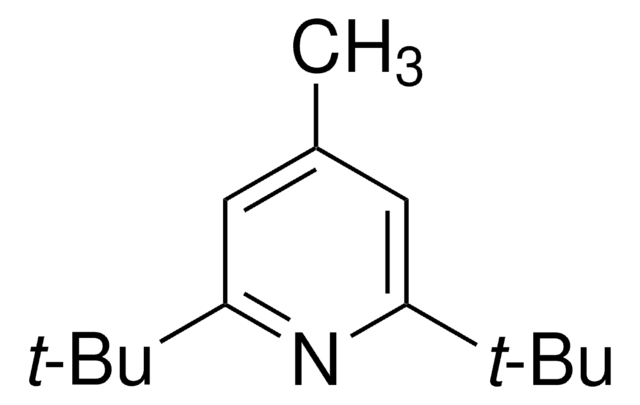164283
Methyl trifluoromethanesulfonate
≥98%
Synonym(s):
Methyl triflate
About This Item
Recommended Products
Quality Level
Assay
≥98%
form
liquid
refractive index
n20/D 1.326 (lit.)
bp
94-99 °C (lit.)
density
1.45 g/mL at 25 °C (lit.)
storage temp.
2-8°C
SMILES string
COS(=O)(=O)C(F)(F)F
InChI
1S/C2H3F3O3S/c1-8-9(6,7)2(3,4)5/h1H3
InChI key
OIRDBPQYVWXNSJ-UHFFFAOYSA-N
Looking for similar products? Visit Product Comparison Guide
General description
Application
- In the determination of polysulfides, zerovalent sulfur in sulfide-rich water wells, and polysulfide species in electrolyte of a lithium–sulfur battery using chromatography-based techniques.
- In reactions with potassium enolates.
- For the conversion of amines to methyl ammonium triflates.
accessory
Signal Word
Danger
Hazard Statements
Precautionary Statements
Hazard Classifications
Acute Tox. 1 Inhalation - Acute Tox. 3 Dermal - Acute Tox. 3 Oral - Eye Dam. 1 - Flam. Liq. 3 - Skin Corr. 1B
Storage Class Code
3 - Flammable liquids
WGK
WGK 3
Flash Point(F)
100.4 °F - closed cup
Flash Point(C)
38 °C - closed cup
Personal Protective Equipment
Certificates of Analysis (COA)
Search for Certificates of Analysis (COA) by entering the products Lot/Batch Number. Lot and Batch Numbers can be found on a product’s label following the words ‘Lot’ or ‘Batch’.
Already Own This Product?
Find documentation for the products that you have recently purchased in the Document Library.
Customers Also Viewed
Our team of scientists has experience in all areas of research including Life Science, Material Science, Chemical Synthesis, Chromatography, Analytical and many others.
Contact Technical Service














